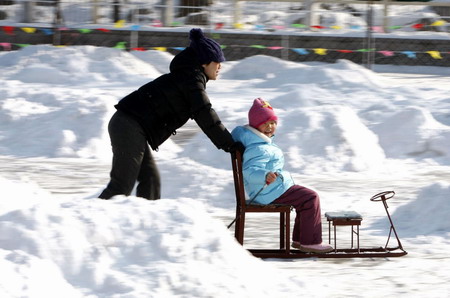Asia-Pacific
Big chill grips north Asia, economic impact 'negligible'
(Agencies)
Updated: 2010-01-04 19:52
 |
Large Medium Small |
|
|
BEIJING/SEOUL: Heavy snows and biting cold hit parts of Asia on Monday, with unusually harsh winter weather snarling up transport across north China, South Korea and India, but little lasting economic damage was expected.
Beijing began the working week after a blast of harsh cold and heavy snow blanketed the capital and surrounding cities over the weekend, paralysing highways and forcing the cancellation of dozens of flights.
As the cold snap pressed east, swathes of the Korean peninsula were also hit by heavy snow on Monday, choking up the rush hour commute in Seoul, where the main domestic airport, Gimpo, cancelled all domestic flights.
|
||||
In China, there were no signs that the cold spell would trigger the weeks-long disruptions and power cuts that hit some parts of southern China in unusually icy weather in 2008.
The icy conditions could push up food prices temporarily by stalling shipments and damaging greenhouses, delay flights, and hold up business in Beijing and other cities for a few days. But Yi Xianrong, an economist at the Chinese Academy of Social Sciences in Beijing, said there would be no significant damage.
"This won't have any impact. It's too small and local," he said. "In fact, all the snow could be a positive thing for agriculture in northern China, which is usually so dry ... The melted snow will help feed crops in spring."
Beijing has become used to milder, largely snow-free winters in recent decades. The snow over the weekend was the capital's biggest since 1951, with falls of up to 20 cm (7.8 inches) in the city's far north near the Great Wall, local TV news reported.
The wave of cold across north China is expected to continue through the first part of the week. The national meteorological office warned that temperatures in the nation's far north could fall to around minus 32 degrees Celsius (-26F).
Beijing is likely to shiver at about minus 10 degrees Celsius in daytime and colder at night, touching decades-old records.
The accumulation in Seoul broke a one-day record of 25.6 cm (10 inches) and is expected to grow, said weather officials, who have been keeping records for about 70 years.
The snow snarled ground transport in South Korea but analysts did not expect any major damage to Asia's fourth largest economy.
The economic impact appeared "negligible" for now, said Park Suk-hyun, a market analyst for KTB Securities in Seoul.
But "if the weather continues to be this snowy, and starts affecting industrial activities in China and other regions, sentiment may be negatively affected by the weather," Park added.
Flight Delays, Energy Supply Worries
With major roads in Seoul covered in snow, commuters spilled on to subways of South Korea's capital, creating major delays with trains and platforms crowded to capacity.
A cabinet meeting was delayed because ministers had trouble making their way through the snow. South Korean roads were littered with fender benders and more than 100 flights at the capital's Incheon airport were either delayed or cancelled.











